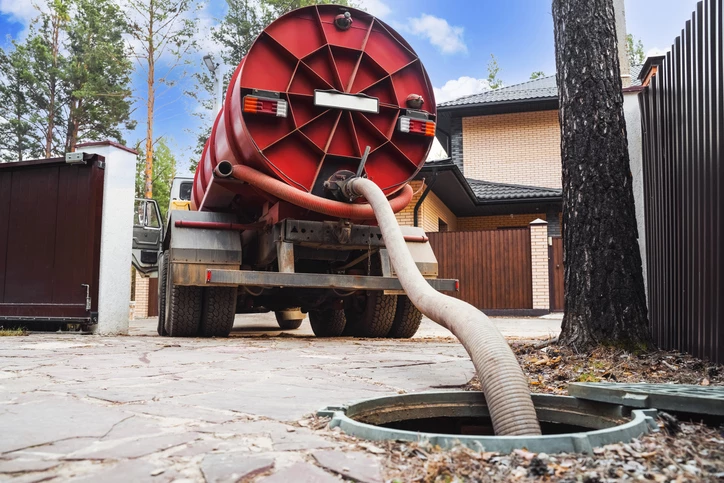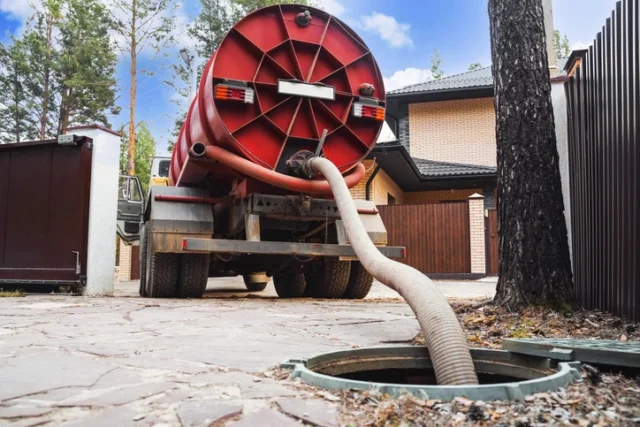
Maintaining a septic system is crucial for the longevity and efficiency of your home’s wastewater management. Two essential maintenance practices are septic tank pumping and cleaning. While they might sound similar, they serve different purposes and are vital in their own rights.
What Is The Difference Between Septic Tank Pumping And Cleaning?
Understanding the distinct roles of septic tank pumping and cleaning is crucial for maintaining an effective septic system. Though both are essential, they target different issues within your septic maintenance routine.
- Septic Tank Pumping: This is the basic maintenance process that should be performed regularly on your septic tank. During pumping:
- Effluent and Solids Removal: A vacuum truck is used to suck out the liquids and floating solids from your septic tank. This primarily includes water waste, or effluent, along with lighter solids like oils and grease that accumulate on the surface.
- Preventative Maintenance: Regular pumping is crucial to prevent the solids from building up to a level that they overflow into the drain field, which can lead to system failures and costly repairs.
- Frequency: Typically, septic tanks need to be pumped every three to five years, but this can vary based on usage and household size.
- Septic Tank Cleaning: This process is more in-depth and is conducted less frequently than pumping. Cleaning includes:
- Thorough Sludge Removal: Cleaning goes beyond just removing the effluent and floating debris; it targets the denser sludge that settles at the bottom of the tank. This sludge is tougher to remove and requires manual scraping and a more aggressive washout.
- Comprehensive Maintenance: By removing all layers of buildup, including the hardened sludge, cleaning prevents long-term issues and restores the full functionality of the tank.
- Restorative Process: This is essential for maintaining the tank’s capacity and efficiency. It extends the lifespan of your septic system by ensuring that it operates effectively without being overloaded by accumulated waste.
While pumping is essential for routine maintenance and smooth daily operations, cleaning addresses the deeper, more ingrained problems that can develop over time. Together, they ensure that your septic system remains reliable, preventing emergency situations and extending the system’s overall lifespan. Regular inspections can help determine the appropriate schedule for both pumping and cleaning, tailored to the specific demands of your septic system.
How Often Should You Pump VS. Clean Your Septic Tank?
The size of your tank, the amount of people living in your property, and your water usage habits are a few of the variables that might affect how often you need to pump and clean your septic tank.
The average interval between septic tank pumps is three to five years. However, this can vary; for instance, a smaller tank or a larger family might require more frequent pumping.
Cleaning is less frequent than pumping because it is more extensive. Most experts suggest a full clean every five to ten years, depending on the condition of the tank and the results of regular inspections. Regular pumping and occasional cleaning can prevent the need for more drastic and expensive repairs or replacements down the line.
What Are The Benefits Of Septic Tank Pumping Compared To Cleaning?
Septic tank pumping offers several distinct benefits that are crucial for the ongoing health and efficiency of your septic system. Here’s a deeper look into how regular pumping can be advantageous:
- Prevention of Clogs and Backups: Regular pumping removes the layers of scum and lighter sludge that accumulate on the top of the tank. This proactive measure is essential to prevent the solids from escaping into the drain field and clogging the distribution lines, which can lead to costly repairs or full system failure.
- Health and Safety: By routinely removing potentially hazardous waste, pumping minimizes the risk of septic system overflows. An overflowing septic tank can lead to environmental pollution and pose serious health risks, including the potential for waterborne diseases and contamination.
- System Efficiency: Regularly pumping your septic tank helps maintain its intended function and efficiency. Removing the buildup allows the septic system to treat and dispose of household wastewater as designed, which keeps the system running smoothly without interruption.
On the other hand, septic tank cleaning delves deeper into the maintenance of your system:
- Comprehensive Maintenance: Cleaning involves removing every layer of waste, including the heavier sludge that settles at the bottom of the tank. This thorough cleanout is critical for tackling the more substantial build-up that regular pumping can’t address.
- Restoration of Tank Capacity: Over time, the accumulated sludge can take up a significant portion of the tank’s capacity, which hampers its ability to hold incoming wastewater. Cleaning restores the tank’s full capacity, thereby improving its operational efficiency.
- Enhanced System Longevity and Performance: By ensuring that all residuals are removed, cleaning extends the life of your septic system and enhances its performance. A clean tank can operate at peak efficiency, with reduced risk of unexpected malfunctions.
While both pumping and cleaning are vital, they serve different purposes. Regular pumping keeps your system running smoothly from day to day, while occasional cleaning addresses deep-set buildups, ensuring long-term health and efficiency of the system. Together, they provide a comprehensive maintenance strategy that keeps your septic system in top condition.
Can Septic Tank Cleaning Replace Regular Pumping?
While cleaning is comprehensive, it cannot replace regular pumping. Think of pumping as regular upkeep and cleaning as a deep-clean or overhaul. Regular pumping ensures that the septic system operates efficiently day-to-day, while cleaning is about long-term maintenance and functionality. Neglecting regular pumping in favor of less frequent cleaning can lead to immediate problems like sewage backups and inefficient filtration.
Moreover, regular inspections and pumping can alert you to potential issues that might require a full clean, ensuring that both maintenance processes work hand in hand to keep your septic system in top condition. It’s always best to adhere to a scheduled maintenance plan tailored to your specific system’s needs to ensure the health of your septic tank.
By understanding the key differences between septic tank pumping and cleaning, you can better manage your home’s septic system, ensuring it remains effective and reliable for years to come.
Regular maintenance not only prevents costly repairs but also protects the environment and your property’s value. Whether it’s the routine removal of waste via pumping or a comprehensive clean, taking care of your septic system is an investment in your home’s future.
Why Choose HoneyBee Septic Tank Service?
At HoneyBee Septic Tank Service, we understand the importance of a well-maintained septic system. If you want your septic system to be in the best possible shape, you need the assistance of our professional staff. To keep your home safe and your septic system running properly, we provide pumping and cleaning services that are customized to fit your system’s unique requirements.
When you need servicing, you can trust that our specialists have the training and modern equipment to get the job done right. We take great delight in our reliability and timeliness, which allow us to be at your service whenever you need us without interfering with your regular routine. We stand out from the competition because of our meticulous service approach and dedication to our customers’ happiness.
Frequently Asked Questions
What is the difference between septic tank pumping and cleaning?
Pumping involves removing the liquid and floating solids from your tank, while cleaning involves a more thorough removal of all solids and residues, including the sludge at the bottom of the tank.
How often should I have my septic tank pumped and cleaned?
We recommend pumping your septic tank every three to five years and cleaning it every five to ten years, depending on usage and household size. Regular inspections can help tailor this schedule to your specific needs.
What are the signs that my septic tank needs pumping or cleaning?
Signs include slow drains, unpleasant odors, water pooling in the drain field, and unusually lush grass around the septic tank area. If you notice any of these, it’s a good idea to call us for an assessment.
Is it more cost-effective to pump more frequently or to clean?
Regular pumping is generally more cost-effective as it prevents the buildup that necessitates more intensive cleaning. Keeping up with pumping can extend the time between costly cleanings.
Call Us Today!
Ready to schedule your next septic service or just have more questions? Contact HoneyBee Septic Tank Service today. Our friendly team is ready to provide you with expert advice and service tailored to your needs. Trust us to keep your septic system running efficiently and effectively.
Don’t wait—ensure your septic system’s health today! Call HoneyBee Septic Tank Service at +17042471145 or visit our website at https://honeybeeseptic.biz/ to learn more about our services or to schedule an appointment. We’re here to ensure that your septic system is not just functioning but thriving!
